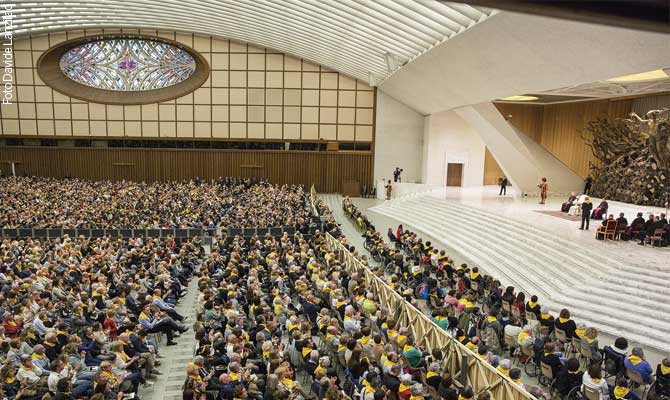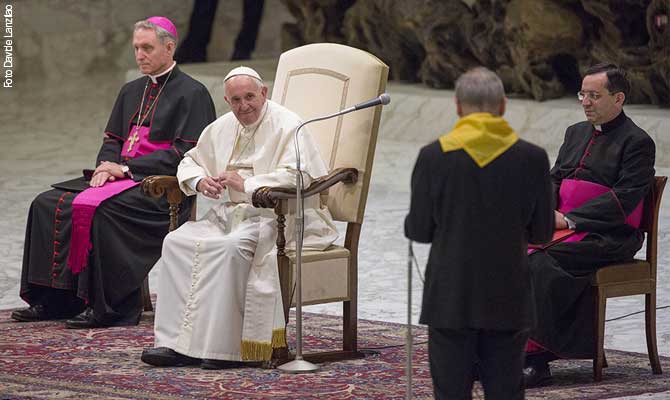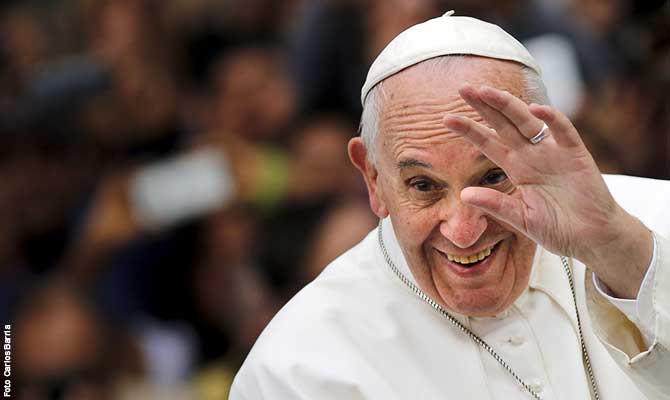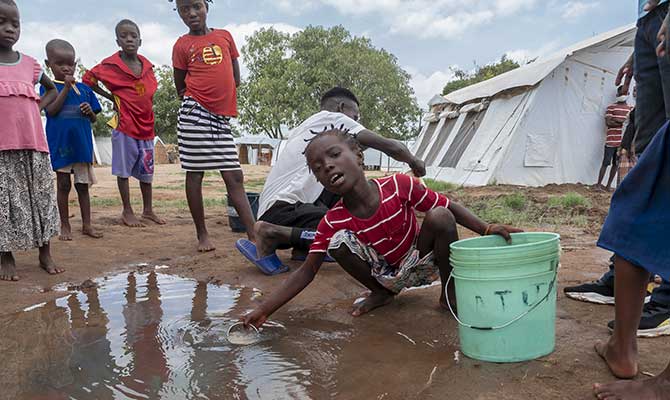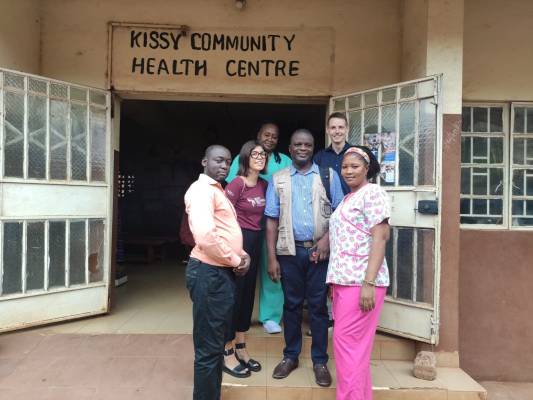Dear Pope Francis,
first of all, thank you. Thank you for the example you have set, and for your gestures and words. They encourage and comfort us, and help us to carry on with our work. People asked me what gift we were going to bring to you (I hope you won’t mind my addressing you with the familiar “tu”, but we truly feel that you are our friend).
I told them that we planned to give you the most precious gift we have to offer: our lives, our families, today, especially, Africa and its people, and our passion and commitment to help improve their lives. These are our gifts; this is what we have brought to you today. I also have two first-hand accounts that I would like to share with you. They were sent to me recently by two of our doctors working in South Sudan, one of the seven Sub-Saharan African countries where we have been present for sixty-five years. They couldn’t be with us today in person, but they are with us in spirit. They are two laypeople, two doctors who have chosen to work together with our working Church, a church that loves going out into the world and helping the most needy, day in and day out.
Here is the first account, from Massimo La Raja, who works in the Lui Hospital in South Sudan:
«Dear Pope Francis, in one of your many surprising sermons,you called on the world’s priests to be ‘shepherds living with the smell of sheep’. Perhaps you used the word ‘smell’ euphemistically. Still, I wonder: what should the ‘smell’ of the doctors and nurses working down here, in the most isolated parts of the world, be like? I am curious to hear your answer; in the meantime, let me describe what we do smell down here. We smell the smell of the earth that people bring into our hospitals, staining everything with a reddish hue; the smell of caked blood, often mingled with that same earth; the smell of disinfectant, concrete evidence of what we are attempting to do here; and the smell of tears and smiles, which have no smell».
And here is another account by Arianna Bortolani:
«I desperately wanted to come to Yirol so I could see the face of Jesus in the most vulnerable, those living forsaken here in South Sudan. Yirolis a governmental hospital with one hundred beds; CUAMM helped rebuild it after the war ended, and continues to support it. Here we carry out the usual work: meeting people’s essential needs, helping mothers give birth, providing Caesarian sections, pediatriccare (especially for the far too many infants who continue to die here), surgical interventions, and so forth… the usual things in African hospitals. Three years ago I felt sure that working here, I would find not only the inevitable difficulties, but also find the true meaning and richness of life. Yet I have to confess: it is very hard. There are the logistical difficulties, certainly – the impassable, muddy roads, the spare partsthat never get here, the market that shuts down because the currency has been devalued. All of this is part of normal life here. But the truly hard thing is looking for Jesus in those we are trying to help. The other day I was so dejected. A young woman died giving birth because she hadn’t been able to get to us on time; she didn’t have the money to be brought here. Health care in South Sudan is truly a privilege for the few, only those who can afford it; it’s anything but a right for all! I’m having a hard time finding you, Jesus. I so much want to see results right away, but the more I look for them, the more it seems that nothing works at all. Even so, every once in a while a prayer or a smile or something that someone tells me helps me to see things in a more positive light. The other day someone said to me, “Doctor, I’ll never forget how you took care of me while I was in prison. I’ve prayed for your family every day since then”. These are the tiny rays of sunshine that help you see the beauty often right in front of your eyes.»
So here is our heart, dear Pope Francis; this is what we have brought you today. Don Luigi Mazzucato, who led Doctors with Africa CUAMM for many years but is now in heaven, dreamed and fought all his life, as we try to do now ourselves, so that everyone – especially the poorest and most vulnerable, mothers and children above all – would have access to health care, or at least to the most essential services that are still lacking or inaccessible in so many parts of Africa. It hurts deep inside to see a mother die as she tries to give birth, or to lose a child to pneumonia or malnutrition.
Perhaps we could transform the World Day of the Sick – a day commemorated by the entire Catholic Church every 11 February – into the World Day for Access to Health Care for All. To envision the possibility for everyone, especially the world’s poorest, to be nursed and looked after with dignity. That’s the wish we’ve brought to you in our hearts.
Thank you, Pope Francis. We truly feel that you are with us, all of us. We want to thank you, first and foremost. But we would also like to thank the Prefecture of the Papal Household, in the person of Monsignor Sapienza, who has been extremely patient with us, because there are so many of us here today; it’s been a bit like the buses in Africa, chaotic and overflowing with people.But we wanted to be here with you. We would also like to thank the Commander of the Gendarme Corps, Dr. Giani. Thank you, Pope Francis, from the bottom of our hearts. Please continue to walk by our side.
⇒ More about the Papal audience for Doctors with Africa CUAMM

